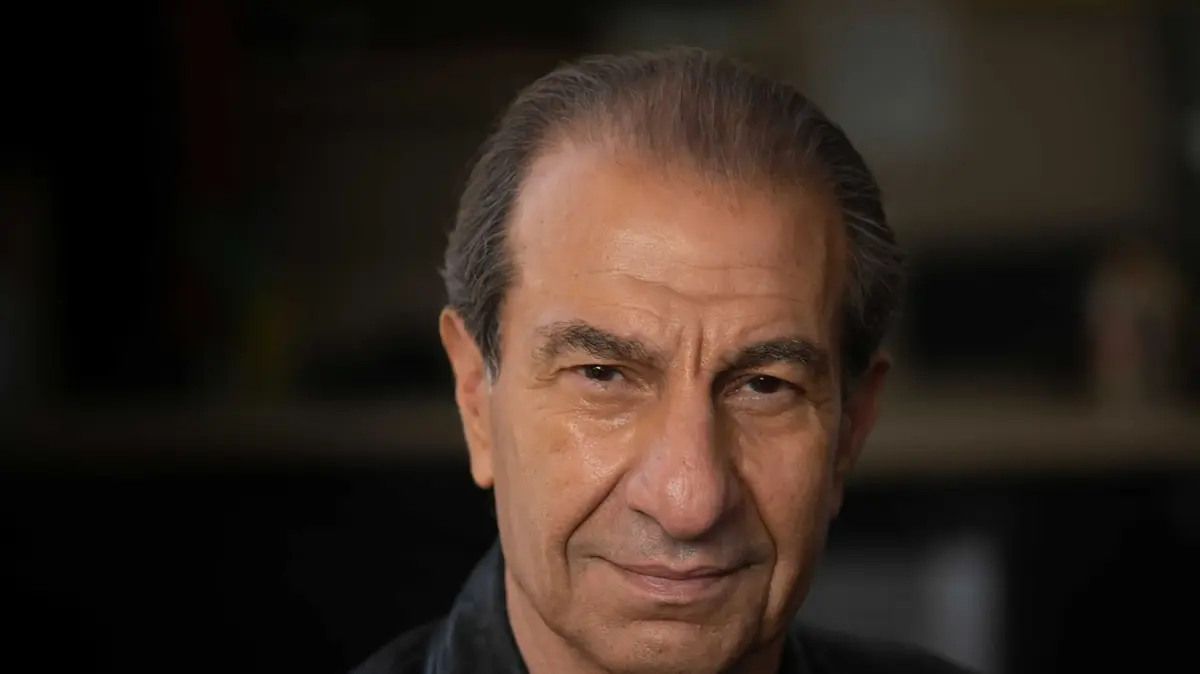"Playing and Singing" and "Echoing Your Voice" proved: there are wounds that only songs can heal
It's hard not to think of these two productions, which were broadcast simultaneously, as sister series, each of which depicts the world of Israeli music through the eyes of men who have difficulty communicating with each other.
Although not without flaws, the fascinating songs that accompanied them gave them deeper dimensions
Nadav Menuhin
31/12/2021
Friday, December 31, 2021, 7:30 p.m.
Share on Facebook
Share on WhatsApp
Share on Twitter
Share on Email
Share on general
Comments
Comments
"Playing and Singing": A Glimpse of the First Episode (yes)
It's almost a miracle: suddenly Israeli music has returned to the screen and prime time in recent times - not only as a reality show, as an obituary or as a yellow item at the end of an edition, but in original songs around original plots. "Mangan and Sher" by yes and "Echo Your Voice" by Here 11 went very far in their pretensions, and in an attempt to represent the world of Israeli music from within. Apparently they were born from different poles: "Echo of Your Voice" is a kind of Tel Aviv-Ashkenazi series, sucked from the early days of Israeli rock and contemporary indie world, while "Playing and Singing" is led by Yemeni heroes from Rosh HaAyin and the journey of one of them to conquer the music world Eastern. But the truth is that they are unusually similar.
It's hard not to think of "Echo Your Voice" and "Play and Sing" as sister series, and not just because they are musical series that aired in parallel: in both the fathers are absent and the protagonists are conducted in their shadow; In both the inheritance is musical, and in both part of this symbolic inheritance is revealed as stolen; In both, the father is disrespectful in his death (Gili Hadad breezes from his father's funeral, while Kobi Shemer urinates on his father's grave); Both star in reality shows while both despise reality and cover versions as a marketing strategy, and in general are very preoccupied with the question of authenticity; Both are suspicious of contracts in the music industry; In both, the treatment of radio is like the king of kings, even though we are deep into the age of social networks; Both embrace very strongly the music of previous generations, and one can go on and on and on.
Equally important, the two series are ultimately about men who have a hard time communicating with each other and expressing themselves until they get into another unnecessary corner.
Therefore it is also worth discussing them separately from their older sister, the "heiress", which takes place in a much more feminine space.
More on Walla!
Marina did Justin, Dalumi did Aylish: The Great Moments of the Annual Parade
To the full article
Hypnotic soundtrack.
The Boys of Beit Shemer from "Echo of Your Voice" (Photo: Moshe Nachumovich)
This is how it is in all generations: in "Echo of Your Voice," Ari Shemer, the charismatic alpha-mail, fails to cope with the success, and with the departure of his wife, and escapes to a life of considerable misery; His son, Kobe, suffers from such intense feelings of inferiority, even towards his son, despises everything his father represents, and manages to shit pretty much everything he touches; And even Lenny, the grandson, escaped in the moment of truth, on the verge of success, from the studio to the beach. In "Playing and Singing" the men are also lost: Father Avichai destroys his son's life in a variety of ways, only to disappear again and again; Gili the protagonist goes into fits of anger and depression in the face of many obstacles, and finds it difficult to admit his feelings; While Yachi, the gray market man, the alternative father, ranges from rage and ruthless violence to loneliness that cannot be contained. They are all restless men.
And if all that is not enough, here is the most successful launch point between the two series is this: the original soundtrack is an essential and fascinating part of them, and not a side note.
"Only in Joy", "What at Nights", "Luxembourg", and "Too Golden Heart" are some of the best songs that have come out here recently with and regardless of these series, and so are the other songs that appear in them.
They are contagious, smart and touching.
Equally important, they give "playing and singing" and "echoing your voice" deeper dimensions, and explain the plots woven around them.
More on Walla!
"Heirs", "Sin", "The Beatles - Get Back", "The White Lotus": 2021 Series Parade - The Big Ten
To the full article
"Playing and Singing" may not have made a lot of noise, but for most of the time it was real candy. First of all, thanks to the excellent acting of its protagonists, led by Bar Tsabari as the rising singer Gili Hadad and Sasson Gabay as the man of the gray market, Yachi, but this is true for almost every one of the characters in the series, main and secondary alike. Sabri is a phenomenon: a singer with grace, really great and varied, which the camera also really likes. The viewer's identification with Sabri-Haddad is absolute, both when he shows confidence and when he shows vulnerability. Everyone already knows "Johnny", but I can not wait until Sabri becomes a superstar. Gabay, for his part, provides another fascinating performance here, in a character that is full of soul alongside unimaginable cruelty. Honestly, the series does not let us forget for a moment that even if he shows generosity, he is a person who does not shy away from severe violence against boys or other unhappy people, and avoids romanticizing this world. The dreamy cast around is compelling and inviting too.
In fact, no less than a musical series, "Playing and Singing" joins a wave of recent crime series in Israel.
Bnei Or, for example, comes to mind as a series in which the protagonists discover the codes of the underworld just as Gili is suddenly exposed to it up close.
At the same time, this concludes the comparison.
This is a different league, much of it thanks to the writing, which respects its characters very much and is honest with them.
Her heroes talk like people talk, smile like people smile, and are flawed like people are flawed.
This is nice in itself in a TV age that is full of over-acting and over-dramatic.
She also enjoys a good rhythm: relatively short episodes of the series nowadays (30 and a few minutes), in each of them at least one song - even if towards the end she is slightly smeared and repeated until the solution of the mystery, hinted at in the name of one of the characters.
Another great show.
Gabay (Photo: Vered Adir)
There are, though, a few notable holes here as well. After the solution to the mystery has really been revealed, it is not clear why Yachi actually put so much effort into tracing Gili's sister, for example. The affair of stealing the song, which has great potential for confrontation, is also resolved almost without leaving a mark. There, shortly after halfway through the series, the writers seemed to run out of ideas. Unfortunately, they also refrained from trying to say anything broader about the genre, the city or about Israeliness in general, and remained on a very personal level. This is one of the reasons that prevented it from becoming a more significant event.
Four original songs were written for the series, and they appear at various stages of the creative process until it explodes in the recording - and the magic works.
It is worth noting, however, that Gili Haddad is a very distinguished musician: he dislikes modern pop, shy away from yellow exposure and endless flattery, admires the veteran giants of the genre, and his arrangements also belong to other times.
In this respect, the artistic conflicts that occupy him are somewhat reminiscent of those of the fictional Shemer family, from the sister series.
Just phenomenal.
Bar Tsabari, star of "Playing and Singing" (Photo: Reuven Castro)
"Echo Your Voice" may be very sophisticated (and sophisticated) and invites a lot of varied readings, but it is also the less fluent series of the two. Two factors particularly failed her. The first problem is the distress that accompanies it and almost never disappears, grabbing the viewer by the throat and not allowing him to even hope for the success of the heroes or identify with them ("Playing and Singing" is also a depressing series, but much more empathetic). In this black comedy, it seems like Kobe Shemer is just slipping over and over again on another banana and another banana and that he will never get a light at the end of the tunnel.
The second problem has to do with the script: "Echo of Your Voice" is very messy, drowning in a sea of ideas and ends of thread, some of which are very original, but they rarely materialize significantly. An example of this is in the autonomous car affair, and in particular the electronic announcer (Siri), who seems to be Kobe's most human connection - a clear parable about his difficulty making connections with other human beings - but each affair ends abruptly after the accident, without evolving beyond that. The same is true of the story of Ari, one of the most ambitious musical parodies seen here on the screens. While some of his stations "talk" with the history of Israeli music, for example the performance with the soldiers in the Yom Kippur War, the whole saga after the disbandment of the band "Shani Menashe" seems a bit strange. The mythology of Israeli music knows artists who have traveled over the years to Germany, Amsterdam, Paris, London or New York. Canada, and the sad adventures it goes through there, do not very much belong to this mythology. As a rule,The load of mirrors, double figures, restraints and crises - all of these are confusing and sometimes tedious.
Slips on a banana over and over and over again. Itamar Rothschild as Kobi Shemer, from "Echo of Your Voice" (Photo: Rotem Yaron)
But in her last episode, where all the lies are exposed, something finally connected, through compassion and sympathy. It begins with the documentary director's brilliant monologue, reveals the great lie about the source of the songs, which presents some particularly original ideas about copyright, inheritance, and the right to use the songs, and continues with the grandmother's decision to finally list those works under "folk" credit. The tangle with a smile. In these two moves "Echo of Your Voice" manages to distill an interesting statement on this subject, but also to provide some redemption and late forgiveness to its protagonists. But the most beautiful moment in the final episode is Lenny's rise to the stage, to give his performance, "My Version of Yours," as the episode is called, the song "Too Golden Heart," the most powerful song in the soundtrack. Lenny, who gets lost in the colorful makeup and attire, decides to come up shirtless, naked, in a sort of scene reminiscent of the shaky ending of "Hedwig and the Nervous Remnant," and perform this painful song,Which is all a desperate war between parents and children, and points - as in that film - to the anomalies and the need for love.
This is really the great strength of "Echo Your Voice": its soundtrack is stunning, and as in a good musical it serves as a key to the plot - until sometimes it seems as if the series was written based on them and not the other way around. This is certainly true of the song "Luxembourg", which contains within it the parting of Ari and Gidi, the impersonation, and the inevitable mistakes, and also of "Next Clouds" that corresponds with it, and of course the deliberately lame cover version of "Fathers and Sons", Shelni Shemer performs the musical reality adaptation Alienated and lost. This version completes a fascinating move: after "Beaufort" took the lament of Eviatar Banai and reinvented it as a memory, "Echo of Your Voice" returns him to the family arena. This is the place to say that it's a shame that the soundtrack does not include more half-versions that are heard here and there throughout the series, as well as Diana Golby's wonderful rendition of "Sad Without It in the Rooms", or the choir's rendition of "Snake Disgust" And to expect from the parents!).Even so - this is a fascinating collection of songs that stands on its own, as a concept album that moves between the three protagonists of the story. What to say: This is easily one of the albums of the year.
There is much more to be said about the two series, and surely more will be said. But it is worth thinking about the starting point: beyond the obvious, why both "playing and singing" and "echoing your voice" chose to discuss the world of Israeli music through the same angle: the heavy shadow of the missing fathers. Is it true that Israeli music progresses through the murder of a father? To what extent is the shadow of the classics from the 70s - or even stars of much later periods - present in Israel in 2021? As I wrote in the first review of "Echo Your Voice", there are some cases where this conflict does exist, but it seems to be a thing of the past. After all, many adult artists are forgotten and disappear, and the rest are struggling for relevance in a world that is increasingly appealing to children. On the face of it, this is an exaggeration.
Perhaps, and this is the best solution I have found to this question, it is quite the opposite: it is not that father-son relations are a parable in the world of Israeli music, but that songs can dismantle the already charged intergenerational relations,And it is precisely in singing in front of a large audience that it is possible to express what is not possible in units.
"There is always a song," there is always something that brings you back from point to point, "sings Ari Shemer, and it seems that the members of the dynasty reconcile with each other only through the same songs." Let me try, let me repair everything that is broken, " At nights "written by his father (and in fact Avi Ohayon), while trying to get closer. Not everything can be cured, but these two series proved that you can always try.
culture
TV
direct watch
Tags
Plays and sings
Echo your voice
Sabri Bar
Sasson Gabay
Itamar Rothschild
Or Amrami Brockman



/cloudfront-eu-central-1.images.arcpublishing.com/prisa/NO6PQFMULJF3JNPJGNL4OYPZGM.jpg)











